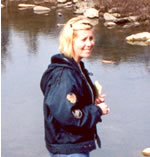 |
Tulane
Engineering Forum
|
|
|
|
|
|
| |
| Opportunities |
| |
| |
| |
| |
Tonja L. Koob
Tonja
L. Koob graduated from Newcomb
College in 1990 with a B.S.
in biology; from Tulane School
of Public Health and Tropical
Medicine in 1993 with a M.S.
in environmental toxicology;
from Tulane School of Engineering
in 1996 with a M.S. in environmental
engineering; and will graduate
from Washington State University
in December 2002 with a PhD
in civil engineering. Tonja
worked with the New Orleans
District of the Army Corps of
Engineers for 3 years before
starting her own engineering
company, Gaea Engineering Consultants.
Her area of expertise is environmental
hydraulics, which includes hydrologic,
hydraulic, sediment transport,
and water quality modeling;
and lake and river ecosystems
restoration. While employed
with the Army Corps of Engineers,
Tonja worked on large-scale
projects including Atchafalaya
Basin Floodway System ecosystem
restoration projects, Mississippi
River sediment diversion projects,
and Coastal Wetlands Planning,
Protection, and Restoration
Act (CWPPRA) projects, as well
as small-scale bayou and lake
restoration projects. She continues
to work in this arena as a consultant
to the Corps of Engineers and
to the Louisiana Department
of Natural Resources. Tonja
is also an adjunct faculty member
in the Tulane Civil and Environmental
Engineering Department teaching
graduate level courses in Sediment
Transport, Wetlands Treatment
Systems, Urban Hydrology and
Drainage, and Stream Restoration. By:
Tonja L. Koob The
Army Corps of Engineers has
developed seven Environmental
Operating Principles that will
guide it in all of its work
in response to the many lessons
learned about the importance
of maintaining a balance between
human needs, economic growth,
and sustaining the environment.
In the past, the science was
not adequate to fully understand
the impacts of human actions
on the environment, but that
is changing as science improves.
From the Everglades of south
Florida to the rivers of the
Pacific northwest, America is
reevaluating those past decisions.
As a nation, we must now take
those lessons learned and apply
them to the decisions we make
today; decisions that will affect
our children and future generations.
The Environmental Operating
Principles foster unity of purpose
on environmental issues, reflect
a new tone and direction for
dialogue on environmental matters,
and ensure that Corps employees
consider conservation, environmental
preservation, and restoration
in all Corps activities. |
 |